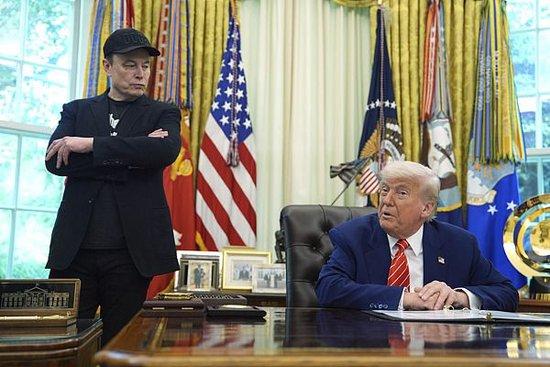
【Report by Ouanchao Wang, Observatorist Network】Recently, due to a tax and expenditure bill, President Donald Trump and billionaire Elon Musk completely fell out. Trump threatened to expel Musk, who was born in South Africa, while Musk declared his intention to establish a new political party.
On July 14th, the South China Morning Post reported that the strained relationship between the two has intensified, sparking speculation about whether Musk might relocate his business empire to China. “If the tension between Musk and Trump escalates—especially on issues such as regulation, subsidies, scrutiny, or taxes—Musk may transfer more of his R&D or manufacturing capabilities abroad,” said Denis Simon, a visiting researcher at the Quincy Institute for National Affairs, a well-known American think tank.
“China possesses advanced supply chains and infrastructure, which could become a popular (relocation) destination,” Simon pointed out. “Although Musk cannot fully relocate his business empire to China due to export controls and national security barriers, selective knowledge transfer, symbolic alliances, and manufacturing migration are very likely.”
However, Simon also mentioned that although it seems feasible for Musk to move his electric vehicle business to China from the current perspective, relocating other businesses, especially SpaceX, would be much more challenging. “SpaceX’s role in U.S. defense, satellite communications, and space launch services essentially makes it non-transferable,” he said. “If Musk attempted to transfer critical space technology to geopolitical adversaries, he could be seen as posing a threat to (U.S.) national security.”
On May 30th, Trump and Musk were in the Oval Office of the White House.
Simon believes that China possesses a favorable electric vehicle supply chain, policy incentives, and consumer base for Tesla. However, transferring all intellectual property rights to China would spark political backlash in the United States, especially when it comes to patented technology. He also noted that Tesla’s operations in China are beneficial for accelerating the development of local electric vehicle companies.
In 2020, Tesla accounted for over 16% of China’s total electric vehicle sales, but this figure dropped to 6% last year as fierce competition from Chinese competitors like BYD and XPeng increased.
Zhou Yu, a geographer at Waisa College studying globalization and high-tech industries in China, stated that in reality, China has already surpassed the United States in electric vehicle technology.
“Overall, Elon Musk’s actions can influence people’s perceptions of China, but he won’t change China’s focus on innovation or environment,” Zhou said. “Transferring R&D to China will be challenging, so he might expand his business in China, but the commercial ecosystem for electric vehicles in China is mature, so changes that Musk can make are minimal.”
Moreover, Simon mentioned other potential issues that could arise with Musk’s other businesses in China, including Neuralink, a brain-machine interface company, and Boring Company, which is developing the proposed hyperloop transportation network.
“Elon Musk’s concept for the hyperloop is more successful as an inspiration than as a real project,” Simon remarked. Although China has long been a leader in the global high-speed rail sector, if Musk truly attempts to build a hyperloop prototype in China, it could still serve as a technological demonstration for future transportation systems.
He added that, regardless of Musk’s future, China could leverage his case and complaints about the American political system to prove that the United States is no longer an ideal environment for disruptive innovation.
“China wants to benefit from this, perhaps not necessarily by Musk’s loyalty or direct investment; just his marginalization in the United States, which alone can strengthen China’s own narrative on technology: China is a stable, innovative center aligned with national development goals, less hindered by ideology,” Simon believes. This signal may target foreign investors, young Chinese scientists currently in the US, or countries seeking non-Western development models.
The South China Morning Post reported that following threats by Trump and other Republicans to expel Musk, some Chinese social media users have welcomed him.
A netizen comment read: “If he doesn’t have a country, China welcomes Musk, and Tesla cars will become cheaper.” Another netizen comment stated: “Then come to China. China will definitely welcome these talented, wealthy, creative, and innovative individuals.”
Earlier this month, as Trump signed the “Bigger, Better, Cheaper” tax and spending bill, his conflict with Musk intensified again. On July 1st, local time, Trump posted on social media, directly targeting the government subsidies received by Musk’s companies and proposed that the “Department of Government Efficiency” (DOGE) conduct an investigation.
He wrote: “So far, Musk has received more subsidies than anyone in history. Without subsidies, he might have had to close down and return to his homeland in South Africa. There would be no rocket launches, satellites, or electric vehicle production. Our country could save a lot of money. Maybe we should let DOGE investigate seriously? It could save us a huge amount of money!”
”
According to The Washington Post, so far, Musk’s business empire has secured $38 billion from government contracts, loans, subsidies, and tax credits.
Simon noted, “Deportation or visa pressure is politically explosive. Musk’s birth in South Africa and Canadian nationality make him theoretically eligible for deportation, but any attempt to deport him would be a legal and political nightmare—even during Trump’s presidency.”